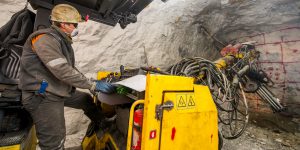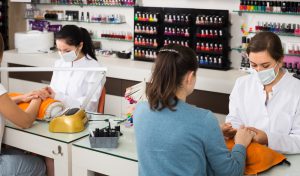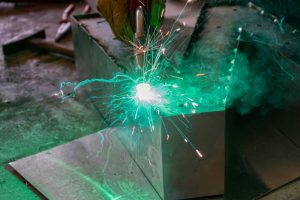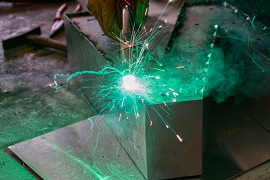We spend a lot of our time indoors; the average person spends about 90% of their time in buildings.
Therefore, pollutants in the air we breathe indoors are a major contributor to our lifetime exposure to air pollutants. In buildings (and vehicles), we are exposed to pollutants released to the outdoors. For example, traffic exhaust fumes that enter buildings through purposeful ventilation, and other air ingress. In addition, we are exposed to a wide range of pollutants generated indoors.
What happens when your job also exposes you to hazards in the air?
Welding and engineering fumes are dangerous, but other chemicals or particles can harm many other employees. As a business owner, it is your responsibility to protect staff and provide Clean Air and personal protective equipment.
Jobs that increase your risk of cancer.
Mining.

Mining is a dangerous business, with different types of mine work increasing the risk for different types of cancers.
For example, coal-mining dust may increase workers’ risk for lung and stomach cancer. While other miners are more likely to come into contact with cancer-causing asbestos, uranium, and radon.
Another problem is diesel exhaust from drilling equipment, which can build up in the shafts.
One study found that underground workers regularly exposed to the exhaust, were five times more likely to develop lung cancer. Compared to workers who weren’t around the fumes.
If you think you’re in a dangerous situation in any profession, there is something you can do.
You have the legal right to know what materials you work with and what their hazards are, by requiring access to material data sheets. Ask your Manager if you are concerned.
Manicure.

A popular addition to the modern-day high street are Nail Bars. Everywhere.
Your perfectly polished nails can pose a serious health hazard to the nail technician who’s painting them. To be fair, it’s not only your manicure that does it, but the dozens of others a technician performs each and every day.
The workers absorb the toxic chemicals through the skin, and they inhale the fumes and contaminated dust in the salon. Thus raising their risk of cancer and a host of respiratory and reproductive problems. Nail salons should be well ventilated, and workers wear long-sleeved shirts, gloves and masks. They should also regularly wash their hands.
To support these safety measures, make sure the salon you or your partner uses protects their nail technicians.
Welding & Grinding

Heating metals to very high temperatures can be incredibly dangerous for the 111 million people around the world who weld.
The culprits are welding fumes, as well as exposure to radiation and asbestos, according to scientists at the International Agency for Research on Cancer.
These toxins can potentially cause lung cancer, kidney cancer, and melanoma of the eye, as well as other health problems.
Concern is most alarming in terms of cancer risk from workplace exposures, but there’s a wide range of problems that can occur only many years after the start of exposure.
This can include damage to the lungs, causing scarring, and damage to other internal organs, including the liver and kidneys.
The welding industry has produced many products to protect the welder from mobile fume extractors to welding masks with in-built fume extraction giving the plate fitter PPE.
Quality, professional makes of welding fume extractors include Nederman, Kemper, Plymovent and ProtectoXtract. See our range of new and pre-used clean air systems here that will provide protection to your workforce.
Reference: Paul Blanc, MD, professor of medicine, division of occupational and environmental medicine, at the University of California–San Francisco and the author of How Everyday Products Make People Sick. Buy his book from Google
Want to hear more? Subscribe to our newsletter for all the latest updates and exclusive offers!

